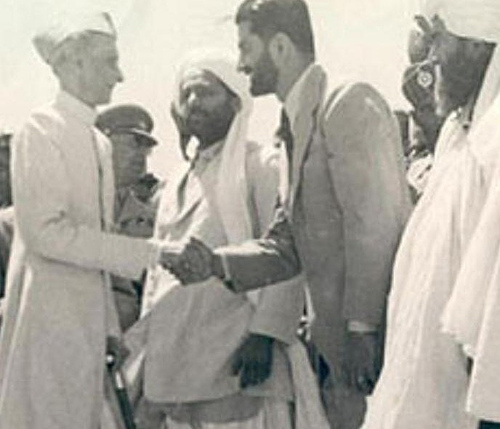Adil Najam
 Government sources in Pakistan have just announced that Nawab Akbar Bugti, chief of the Bugti tribe, veteran politician, and senior Baluchistan leader, has been killed in a shootout between “tribal militants and government forces” in Balochistan.
Government sources in Pakistan have just announced that Nawab Akbar Bugti, chief of the Bugti tribe, veteran politician, and senior Baluchistan leader, has been killed in a shootout between “tribal militants and government forces” in Balochistan.
This is very sad and disturbing news that cannot bode well for anyone. While details are still coming in, BBC reports:
The battle near his mountain hideout in south-west Pakistan also caused heavy casualties on both sides, reports say. More than 20 soldiers and at least 30 rebels died, officials say. The octogenarian has been at the head of a tribal campaign to win political autonomy and a greater share of revenue from Balochistan’s gas reserves. “It is confirmed, Nawab Bugti has been killed in an operation,” Information Minister Mohammad Ali Durrani told Reuters news agency. The battle reportedly took place near the town of Dera Bugti, not far from Mr Bugti’s hideout.
According to a newsflash posted on The News website:
Jamhori Watan Party (JWP) chief Nawab Akbar Khan Bugti was killed in a historical operation carried out by security forces in Kohlu and Murree tribal areas on Saturday night, Federal Information Minister Muhammad Ali Durrani confirmed… Pakistan People’s Party Parliamentarians (PPP-P) leader Makhdoom Amin Faheem termed Akbar Bugti’s death an incident which could worsen security situation in Pakistan.
The death, and the manner of death, of the veteran Baluch leader will indeed worsen the security situation in Baluchistan and exacerbate the feeling of marginalization amongst Baluchis. Nawab Bugti had, at various points in his life, ‘butted heads’ with just about all major leaders in Pakistan. His recent standoff with the Musharraf government was not the highpoint of his own political career but it may well be the lowest point of the Musharraf rule. However, more than the implications on immediate politics – which will become more clear and more pronounced over the next many days – this marks a tragic end to the life of an important political leader.
 Born on July 12, 1927, Nawab Bugto was a ‘ tribal’ who was educated at Oxford, England, Aitchison College, Lahore and Karachi Grammar School and has served as Governor and Chief Minister of Baluchistan. Mr. Bugti’s legacy was clearly a mixed one and will be much debated and much dissected. He was, however, a major leader and this was indeed a sad and tragic way to go.
Born on July 12, 1927, Nawab Bugto was a ‘ tribal’ who was educated at Oxford, England, Aitchison College, Lahore and Karachi Grammar School and has served as Governor and Chief Minister of Baluchistan. Mr. Bugti’s legacy was clearly a mixed one and will be much debated and much dissected. He was, however, a major leader and this was indeed a sad and tragic way to go.




















































he held power and what he did with it?
all the time he whined that Centre is not feeding
him resources!
during his 30 (whatever)years of political life
he never made a single school in sui and derabugti
…
have some life ppl!
he got what he deserve…
he bombarded over my parents ….
that man thoroughly deserves that!
DEAR
I am going to directly mention you that Our Military is more powerfull and very nice Rules and Regulation i personely i like this ARMY
It is very good Action of our Military to Took STEP Against the Akbar Buti
He was very Stupied Person he is very third class person
i count him in the low community
he considered this country nothing therefore he is doing that illegale work
SHAME FOR HIM
Akbar Bugti photos now appearing on Goods truck. A place that was once reserved for Noor Jehan and Ayub Khan photos:
http://www.flickr.com/photos/rajaislam/513469727/i n/photostream/
It’s funny people call 1971-Bangladesh a tragedy. It ain’t a tragedy, that was bound to happen. After Jinnah, this country went in the hands of mobsters and the rest is history.
Plus East/West Pakistan didn’t make any sense especially when a country is new and is short changed on military to hold such territory.
Baluchistan/Bangladesh comparisons are fundamentally wrong – and mostly driven by paranoia. Conditions of 1971 do not equate to current political situation in historical or strategic sense.
Bugti et. al. is another case and point. To some, just like Elvis Presley, he is still alive. And the claims that he did a lot for Baluch people have no merit or substance. Lets see a real list of his achievements and his sacrifices in terms of Baluchi people?